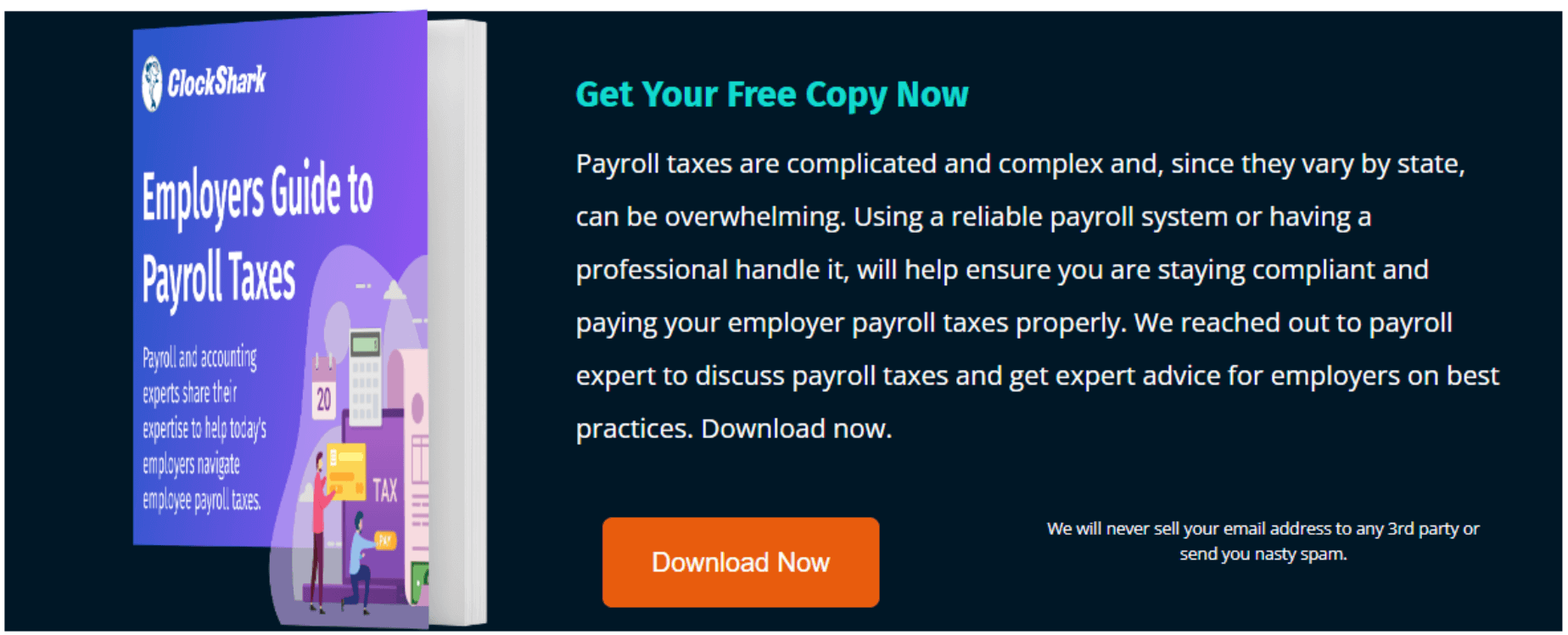DISCLAIMER: ClockShark is not a payroll provider or tax expert and cannot provide legal advice or counsel about payroll taxes. The information included in this guide is intended for guidance and can vary depending on your location and many other factors. Be sure you find a qualified payroll professional such as 24hr Bookkeeper that can advise you on your payroll taxes.
With so many rules and regulations surrounding taxes, it can be overwhelming to clearly understand what payroll taxes are and what your responsibility, as an employer, actually is.
Even if you use a payroll and HR platform such as Gusto, for example, that can do all of the necessary payroll calculations, it’s still helpful to understand how and why employer payroll taxes work.
We reached out to Karine Woodman founder of and Heather Tardy, payroll expert with 24hr Bookkeeper to discuss payroll taxes and get expert advice for employers on best practices.
What Are Payroll Taxes?
Payroll taxes are taxes paid on any wages paid to an employee that go to support social programs such as Medicare and social security.
In America, the largest source of tax revenue for the U.S. government is individual taxes at 40.72 percent, followed by social insurance taxes (25.1 percent), consumption taxes (17.58 percent), property taxes (12.2 percent), and corporate taxes (4.35 percent), according to the Tax Foundation.
There are different types of payroll taxes and while some are paid by the employer, most are deducted from the gross pay of the employee.
According to the Internal Revenue Service, employers are responsible for reporting income and employment taxes they withhold from employees, and failing to comply with these laws can result in civil and criminal sanctions for evasion of employment taxes. Further, employees can suffer if their employer fails to pay these taxes on their behalf by not being able to collect Social Security, Medicare, or unemployment.
Common Payroll Mistakes Employers Make
Karine Woodman says there are a few common mistakes that employers make when it comes to doing payroll properly. These five most common mistakes are:
- Making tax deposits late
- Not making the tax deposits at all
- Not filing payroll returns on time
- Not keeping good payroll records
- Not sending their payroll provider child support orders or garnishments for their employees
“Not paying an employee through the payroll system or service affects state and federal reporting,” Woodman explains. “It's even more difficult when they don't let their payroll provider know that they paid an employee outside of the payroll service.”
Employers need to be on top of their communication with everyone involved.
“Communication with their payroll provider is key and when they don't let them know they gave employees a bonus, they let an employee go, or that an employee quit, it makes it difficult to stay on track.”
Woodman understands that payroll can be particularly challenging for smaller businesses that rely on income from their customers. As a small business, it’s important to try to stay ahead when you’re dependent on timely payments from clients.
“When their customers don't pay on time, it affects their cash flow. This greatly affects their ability to make payroll tax payments on time and even give them peace of mind when processing payroll,” she says.

Important Payroll Stages
There are four main times that employers should focus on when preparing for payroll taxes:
- Hiring stage
- Paycheck stage
- Quarterly
- Annually
1. Hiring
The hiring stage is when employees fill out an I-9 form to verify their eligibility to work in the U.S. and a W-4, to establish tax withholding rates. These forms should be filled out before the employer performs any work.
2. Paychecks
Payroll is usually run in one of four ways:
- Weekly
- Biweekly
- Semimonthly
- Monthly
The Bureau of Labor Statistics reports that biweekly is the most common pay period established by employers, followed by weekly.
Regardless of which pay period frequency an employer uses, employers will need to withhold the correct amount for their workers’ Federal income tax estimate as well as their Medicare and Social Security taxes. As an employer, you match the employees’ tax deductions for Medicare and Social Security.
3. Quarterly
The quarterly tax responsibility for employers is to file quarterly tax forms and remit payment with the funds you have withheld from your employees’ earnings. You’ll need to file form 941 plus the equivalent state form, as well as federal taxes to the appropriate government agencies.
These forms and monies should be paid every quarter: April 30, July 31, October 31, and January 31.
In addition to withholding taxes from employees, there are other taxes that employers must pay that the employees are not required to pay.
As Heather Tardy explains, monies are paid weekly, bi-weekly, monthly, or quarterly based on your deposit schedule.
4. Annually
Year-end payroll tax responsibilities must be filed by the employer by January 31. You must send form W-2 to your employees summarizing their year’s wages, taxes, etc. by Jan. 31, and for contractors, you’ll need to provide a form 1099-Misc.
These are submitted to the IRS accompanied by forms W-2S and W3, as well as 1096 for 1099-MISC’s. As opposed to the quarterly form 941, the annual form to reconcile payroll taxes is form 944.
Employer Payroll Tax Responsibilities
The taxes withheld from employees’ earnings belong to the employee and, in some cases, must be matched by you, the employer. Other employer taxes are your responsibility as an employer.
Federal Income
Tax Employers are responsible for withholding federal income taxes from employees’ wages. This amount will vary depending on the employee’s W-2.
FICA
These taxes are withheld and used to fund Social Security and Medicare. Heather Tardy says these amounts must be matched by the employer. Specifically, “The employer matches everything for social security and for medicare the employer matches everything except the additional amount for Medicare.”
“For Social security there is a wage base of $137,700.00,” she explains. “Once you have earned that amount in the year, social security is no longer withheld. For Medicare this only changes for wages in excess of $200,000.00 once you make over that there is an additional 0.9 percent Medicare tax.”
FUTA
Federal Unemployment is another tax paid by employers, based on a percentage of what they pay employees. It is not deducted from the employee and goes into a federal unemployment fund to cover unemployment costs of workers who were laid off or otherwise left involuntarily.
SUTA
Like FUTA, SUTA is another unemployment tax that is paid by employers, but on the state level. While employers pay both state and federal unemployment taxes, it’s important to understand different states have different laws.


